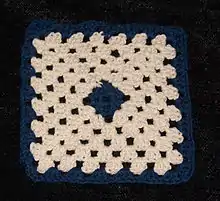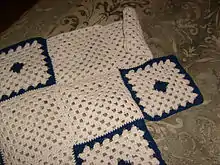Granny square
A granny square is a piece of square fabric produced in crochet by working in rounds from the center outward. Granny squares are traditionally handmade. They resemble coarse lace. Although there is no theoretical limit to the maximum size of a granny square, crocheters usually create multiple small squares (called "motifs") and assemble the pieces to make clothing, purses, Afghan blankets, and other household textiles.

Granny square apparel is a cyclical fashion that peaked in the 1970s. As Stitch 'n Bitch series author Debbie Stoller describes:
If you grew up in the seventies, as I did, you might fear the granny square--if only because, for a while, clothing was made of nothing else. Granny square vests, granny square shorts, granny square hats. Heck, I bet there was some kid out there who was forced to go to school wearing granny square underwear.[1]
Although particular color and pattern schemes for granny squares change with time, this class of motif is a staple among crocheters. Multicolor granny squares are an effective way to use up small amounts of yarn left over from other projects and basic granny square motifs do not require advanced skills to execute.[2]
Construction


According to Edie Eckman in The Crochet Answer Book,
The familiar granny square is a special form of square motif. Although there are many variations on the granny square, the traditional one is a double-crocheted square made with a series of chains and double-crocheted blocks--a kind of filet crochet in the round.[3]
Any granny square begins with a small loop of chain stitches. Basic granny squares alternate sets of double stitches and chain stitches. Variant patterns use different stitch types or produce other geometric shapes such as hexagons. In order to achieve a distinct angle at the corners the designer uses extra chain stitches.[4] Subsequent rounds are added by wrapping multiple stitches around the existing chain stitches. Hundreds of variant motifs are in use and entire books have been devoted to granny square designs.[5]
References
- Stoller, Debbie. Stitch 'N Bitch Crochet: The Happy Hooker New York: Workman Publishing, 2006, p. 66.
- Stoller, p. 67.
- Eckman, Edie. The Crochet Answer Book, North Adams, Massachesetts: Storey Publishing, 2005, p. 147.
- Stoller, pp. 66–67.
- Eckman, pp. 97, 158.
Further reading
- Cottrell, Susan; & Cindy Weloth. The New Granny Square, Ogden, Utah: Lark/Chapelle, 2006. ISBN 978-1-57990-980-2
